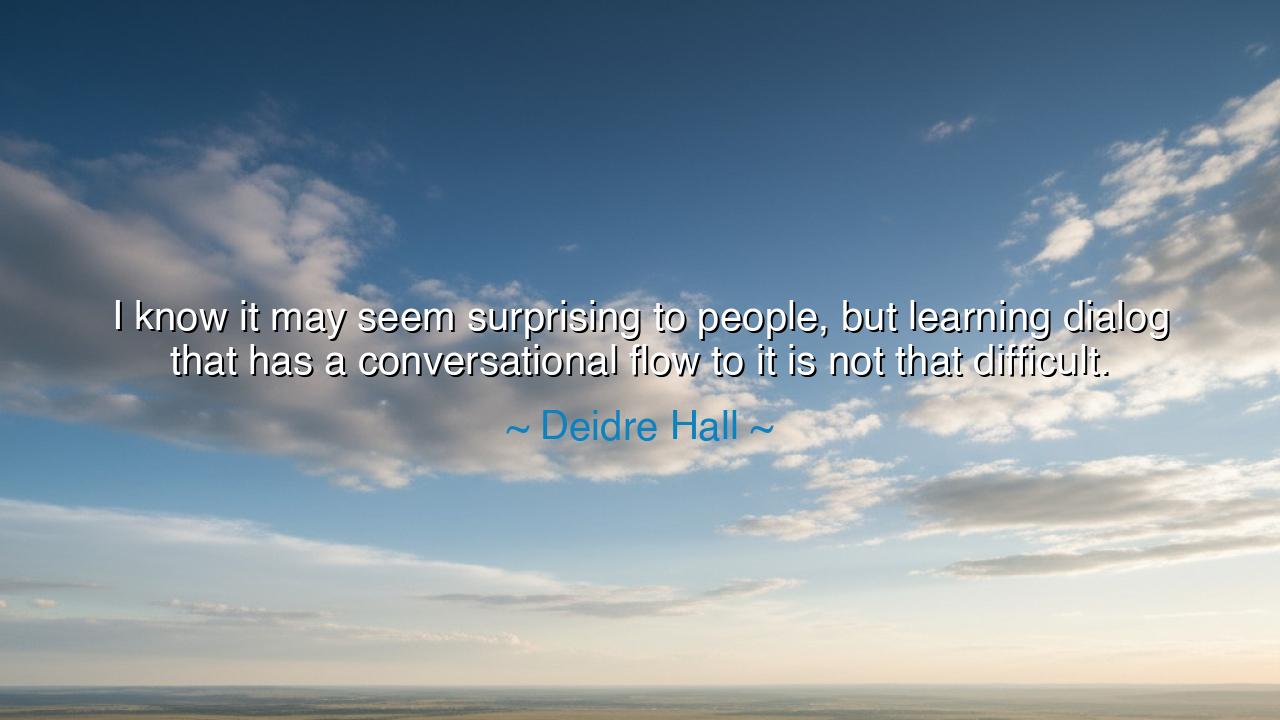
I know it may seem surprising to people, but learning dialog that
I know it may seem surprising to people, but learning dialog that has a conversational flow to it is not that difficult.






Hear the words of Deidre Hall, spoken with the insight of one who has walked long in her craft: “I know it may seem surprising to people, but learning dialog that has a conversational flow to it is not that difficult.” In this statement lies a gentle wisdom, for she reveals that the art which seems complex to the outsider may, when approached with patience and skill, become natural, like breathing. The mystery of dialog is not in memorization alone, but in the rhythm of human connection, the ebb and flow of words shaped by real life.
To learn dialog is not to repeat lines as a machine repeats commands, but to enter into the living pulse of conversation. Conversation has its own music—the pauses, the inflections, the rise of laughter, the fall of sorrow. When an actor grasps this, the lines no longer feel foreign but become the natural extension of thought. Hall reminds us that this is not a task of great burden, but one that can be mastered with care, because it is rooted in what we already know: the shared human act of speaking and listening.
Consider the ancient art of oratory, practiced by the Greeks and Romans. Cicero, Demosthenes, and others trained not merely to recite words, but to let them flow as though born in the moment. It was said that Demosthenes practiced speeches by the sea, speaking above the roar of the waves, until his words carried both force and fluidity. He, too, understood that the secret was not mechanical repetition, but the natural cadence of speech. So it is with actors learning dialog: it must flow like a river, not stumble like stones.
Hall’s statement also challenges the awe and intimidation that outsiders often feel toward artistic skill. To the public, the work of memorizing and performing may seem a mountain impossible to climb. But she reveals the truth: when the task is broken into rhythm, into conversational flow, it is not as difficult as it appears. This is the wisdom of many crafts. The mason knows that laying stone by stone is not so hard once the hand learns its rhythm. The scribe knows that writing line by line becomes natural once the pattern is grasped. What seems insurmountable is made possible by flow.
There is also humility in her words. By saying it is “not that difficult,” Hall does not diminish the art, but rather elevates the humanity within it. She reminds us that dialog is not alien—it is born from the same currents of speech we use every day. An actor’s task is not to invent language anew, but to return to the roots of human expression, to listen deeply, and to echo truth. In this sense, the actor is like the storyteller of old, who did not recite by rote but spoke from the heart with a rhythm familiar to all who gathered around the fire.
The lesson is radiant: do not be daunted by tasks that seem impossible from afar. What looks difficult may, with practice, reveal itself to be natural. Approach your work—whether in art, study, or daily life—not with fear, but with curiosity for its rhythm. Find the flow, and let it carry you. For when one works in harmony with the natural cadence of a task, the struggle diminishes, and mastery is found.
Practical action follows. When learning a new skill, seek its rhythm. If you must memorize, do not cling to words like lifeless stones—speak them, live them, breathe them. If you must labor, do not fight the work as though it were your enemy—find the movement that makes it smooth. And above all, do not be deceived by appearances; what seems hard is often softened by practice, patience, and flow.
Thus, Deidre Hall’s words shine as encouragement across generations: that dialog with a conversational flow is not beyond reach, but a skill born of listening, rhythm, and humanity. Let us remember that the most daunting mountains are climbed not in leaps, but in steps that flow like conversation itself—natural, steady, and enduring.






AAdministratorAdministrator
Welcome, honored guests. Please leave a comment, we will respond soon